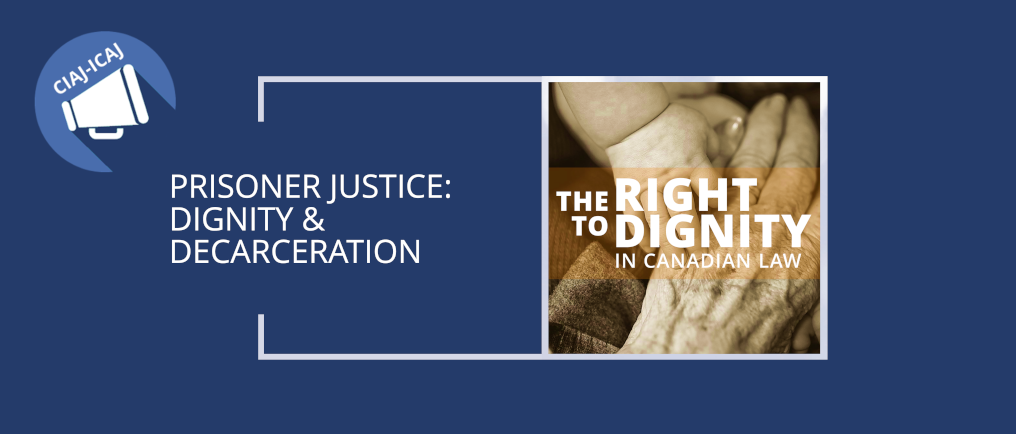Prisoner Justice: Dignity Through Decarceration

Despite frequent mention of human dignity throughout Charter jurisprudence, its articulation as a legal norm has its challenges. The consequences of this gap are most strongly felt by those who are vulnerable and marginalized. The point is acute with regard to the Canadian carceral system. The evidence is increasingly clear that traditional penal approaches to criminal justice often fail to improve public safety while undermining human dignity.
Decarceration is a concept rooted in restorative justice. The supreme court in R v Gladue (para 71) described restorative justice as “… an approach to remedying crime in which it is understood that all things are interrelated and that crime disrupts the harmony which existed prior to its occurrence, or at least which it is felt should exist. The appropriateness of a particular sanction is largely determined by the needs of the victims, and the community, as well as the offender.”
Sentencing principles grounded in restorative justice generally avoid using prison as a sanction. Rather, grounded in the Canadian context, these principles amongst others set out in s.718 of the Criminal Code, seek (d) to rehabilitate offenders (e) to provide reparations for harm done to victims and (f) to promote a sense of responsibility in offenders, and acknowledgement to those affected of the harm done to the affected community.
In May 2022, it was reported by the Correctional Investigator that 50% of women held in federal prison identified as Indigenous. Indigenous people make up only 5% of the total population in Canada. However, over 30% of the total population in federal custody are Indigenous. The rate of incarceration of Indigenous people in Canada is 9.2 times higher than the rate of incarceration of non-Indigenous people. Over Incarceration of Indigenous people was identified as a crisis by the Supreme Court in 1999, when the rates were lower than they are today.
The effects of this carceral reality may be compounded by the sometimes harsh realities within prisons. There are severe access to justice issues for the prison population. The provisions of the Corrections and Conditional Release Act (CCRA) (ss.81 and 84) which attempt to address over-representation of Indigenous people provide mechanisms for people to serve their custodial or community portions of their sentences under supervision of Indigenous communities. However, the underfunding of Indigenous-run healing services means that ss.81 and 84 of the CCRA are seldom used, and few Indigenous people can benefit from their use (The role of prison in genocide and crimes against humanity against Indigenous people in Canada).
This results in Indigenous prisoners higher rates of use of force in prison, death by homicide, suicide, self-harm and solitary confinement, under the previous and new Structured Intervention unit regime. Further, access to legal representation, and the ease of such representation, is difficult and faces many challenges.
The panel will therefore explore sound alternative models including Indigenous and other restorative justice practices as well community-based justice models aimed at the rehabilitation of offenders and victim restoration.
This topic and many more will be discussed at CIAJ’s 46th Annual Conference on “The Right to Dignity in Canadian Law,” which will take place October 26–28, 2022 in person in Halifax, NS, and Online.
Some seasoned panellists will be offering their expertise and personal experience on Panel 6:
Panel Chair
- Emma Halpern, Executive Director & Manager of Legal Services, Elizabeth Fry Society of Mainland Nova Scotia
Speakers
- Patricia Whyte, Indigenous Peer Support Worker & Residential Manager, Elizabeth Fry Society of Mainland Nova Scotia
- Jennifer Metcalfe, Lawyer & Executive Director, Prisoners’ Legal Services/West Coast Prison Justice Society, BC
Panel 6 keywords: criminal law, detention centres, parents and their children in prisons, dignity, criminal justice reform, decarceration, sentencing, discharge planning, gender inequality, penal moderation, solitary confinement.
More blog posts on dignity are available on this page: https://ciaj-icaj.ca/en/blog/
Conference Overview
CIAJ’s 46th Annual Conference, entitled “The Right to Dignity in Canadian Law,” will discuss dignity as a fundamental human right. The conference will cover the many facets of the concept of dignity, from moral and philosophical notions to its uses as a legal norm. Discussion of the topic will be grounded in eminently pertinent issues such as the role of dignity in gender identity and reproductive rights, as well as medical assistance in dying, elder care, disability, and equality rights. The role of dignity will also be discussed in the context of the Canadian criminal justice and carceral systems, particularly with regards to Indigenous Peoples, restorative justice, the United Nations Declaration on the Rights of Indigenous Peoples, and reconciliation.
